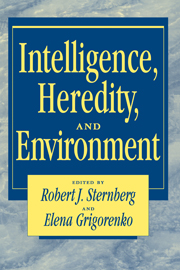Book contents
- Frontmatter
- Contents
- List of contributors
- Preface
- Part I The nature–nurture question: New advances in behavior-genetic research on intelligence
- Part II Novel theoretical perspectives on the genes and culture controversy
- 6 The invalid separation of effects of nature and nurture: Lessons from animal experimentation
- 7 Between nature and nurture: The role of human agency in the epigenesis of intelligence
- 8 A third perspective: The symbol systems approach
- 9 A cultural-psychology perspective on intelligence
- 10 A bio-ecological model of intellectual development: Moving beyond h2
- 11 An interactionist perspective on the genesis of intelligence
- Part III Specific issues in the nature–nurture controversy
- Part IV Integration and conclusions
- Name index
- Subject index
8 - A third perspective: The symbol systems approach
Published online by Cambridge University Press: 05 June 2012
- Frontmatter
- Contents
- List of contributors
- Preface
- Part I The nature–nurture question: New advances in behavior-genetic research on intelligence
- Part II Novel theoretical perspectives on the genes and culture controversy
- 6 The invalid separation of effects of nature and nurture: Lessons from animal experimentation
- 7 Between nature and nurture: The role of human agency in the epigenesis of intelligence
- 8 A third perspective: The symbol systems approach
- 9 A cultural-psychology perspective on intelligence
- 10 A bio-ecological model of intellectual development: Moving beyond h2
- 11 An interactionist perspective on the genesis of intelligence
- Part III Specific issues in the nature–nurture controversy
- Part IV Integration and conclusions
- Name index
- Subject index
Summary
A paradox: The triumph of hereditarian and environmental explanations
When there are competing explanations for a set of phenomena, one of two outcomes can generally be anticipated. Either evidence steadily accrues in favor of one side of the argument; in such a case, the competing position (e.g., phlogiston or Lamarckianism) is gradually abandoned or radically reformulated. Or it is determined that neither side of the debate will triumph, either because the contrasting case proves too difficult to refute, or because the apparently conflicting issues have been improperly formulated.
In the behavioral sciences, no issue has been more passionately joined than the relative contribution to human behavior of hereditary (genetic) or environmental (cultural) approaches. In one sense, the debate dates back at least to the beginnings of the modern philosophical era: Contemporary hereditarians (hereafter Hs) can date back their pedigree to Descartes and Leibnitz, while contemporary environmentalists (hereafter Es) can trace their intellectual heritage to the British empiricists, such as Locke and Hume.
In the past century, since the times of the evolutionary theorist Charles Darwin and the pioneering geneticist Gregor Mendel, the issue has been joined with ever greater sharpness, even as the pendulum has continued to swing between the rival positions. For the first several decades of the behavioral sciences, the view held sway that humans were hostages to their biological heritage. Then, with the advent of the Behaviorist and Learning Theory approaches, the contributions of the environment were reciprocally stressed.
- Type
- Chapter
- Information
- Intelligence, Heredity and Environment , pp. 243 - 268Publisher: Cambridge University PressPrint publication year: 1996
- 1
- Cited by

